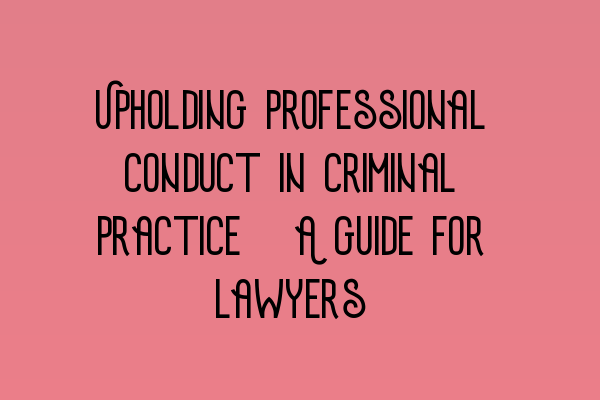Upholding Professional Conduct in Criminal Practice: A Guide for Lawyers
Welcome to SQE Criminal Law & Practice Law UK’s blog post on upholding professional conduct in criminal practice. As a lawyer, maintaining high ethical standards and professional conduct is essential for a successful and reputable legal career. In this guide, we will provide you with valuable insights and tips on how to navigate the complex world of criminal practice while ensuring adherence to professional conduct rules and regulations.
Understanding Professional Conduct
Professional conduct refers to the ethical principles and guidelines that lawyers must follow to maintain their integrity, trustworthiness, and credibility. It sets the standards for how lawyers should behave and interact with clients, colleagues, and the legal system as a whole.
As a criminal lawyer, your professional conduct plays a crucial role in establishing trust with clients, building a strong reputation, and ensuring fairness and justice in the criminal justice system. It is essential to be familiar with the Solicitors Regulation Authority (SRA) Code of Conduct and other relevant legal frameworks governing professional conduct.
Key Elements of Professional Conduct
To uphold professional conduct in criminal practice, there are several key elements that lawyers should prioritize:
- Confidentiality: Ensure the confidentiality of client information, adhere to legal professional privilege, and only disclose information when necessary and legally obligated to do so.
- Conflict of Interest: Identify and manage any potential conflicts of interest between clients or between personal and professional interests to maintain neutrality and undivided loyalty to clients.
- Client Communication: Maintain clear and transparent communication with clients, providing them with accurate and timely information about their case, legal options, and potential outcomes.
- Fees and Billing: Handle fees and billing matters fairly, providing clients with transparent information about costs, billing practices, and any potential additional charges.
- Competence: Continuously develop and enhance your legal knowledge and skills to provide competent and effective representation to clients.
Professional Conduct Challenges in Criminal Practice
Criminal practice presents unique challenges that test a lawyer’s commitment to upholding professional conduct. These challenges may include:
- Ethical Dilemmas: Criminal cases often involve complex ethical dilemmas, such as representing clients who may be guilty or balancing the duty to the court and duty to the client.
- High-Stakes Pressure: The high stakes involved in criminal cases can create pressure to compromise professional conduct. It is crucial to stay true to ethical principles, even in challenging circumstances.
- Emotional Impact: Dealing with criminal cases can be emotionally demanding. It is important to maintain professionalism and emotional resilience while providing support to clients.
Tips for Upholding Professional Conduct
To ensure you uphold professional conduct in criminal practice, consider the following tips:
- Stay up to date with the latest legal and ethical guidelines and regulations.
- Seek guidance from experienced mentors and colleagues when faced with complex ethical situations.
- Communicate openly and honestly with clients about their rights, obligations, and the potential risks and benefits of different legal strategies.
- Maintain regular professional development to enhance your legal knowledge and skills.
- Establish clear and ethical billing practices, ensuring clients understand the costs involved.
For further insights into legal practice and preparation for the SQE exams, you may find the following articles helpful:
- SQE 1 Practice Exam Questions
- SQE 1 Practice Mocks FLK1 FLK2
- SQE 2 Preparation Courses
- SQE 1 Preparation Courses
- SRA SQE Exam Dates
Upholding professional conduct is not only a legal obligation but also a sign of your integrity and commitment to justice. By following the guidelines and tips outlined in this guide, you can navigate criminal practice with confidence and maintain your reputation as a trusted and ethical lawyer.
